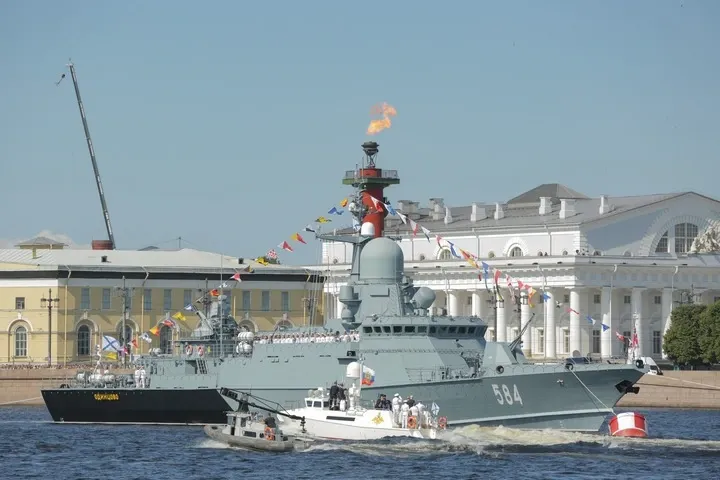Has Putin Unveiled a New Strategy for Russian Navy Development?

Synopsis
Key Takeaways
- Long-term strategy for Russian Navy development through 2050.
- Focus on adapting to global maritime challenges.
- Strategic objectives for both peacetime and wartime.
- Significant investments of 8.4 trillion rubles for modernization.
- Russia maintains a fleet of 79 submarines and 222 warships.
Moscow, June 9 (NationPress) Russian President Vladimir Putin has sanctioned an extensive long-term blueprint for the enhancement of the Russian Navy extending through 2050, according to an interview with presidential aide Nikolai Patrushev released on Monday.
"This strategy evaluates the Navy's existing condition and abilities, informed by operational insights from the special military operation," Patrushev, who also chairs the Maritime Board, was reported by the Russian news outlet Arguments and Facts.
He highlighted that constructing a formidable and contemporary navy necessitates a long-term perspective on the global maritime landscape, evolving military threats, and distinctly outlined national objectives, as reported by Xinhua news agency.
The document, which received Putin's endorsement on May 30, encompasses an assessment of the global military-political climate, potential conflict scenarios, and the naval capabilities of leading nations. It articulates strategic aims for Russia’s naval forces during both peacetime and wartime, as well as essential parameters for the fleet's future structure and modernization.
"In essence, this is a crucial long-term document that addresses how Russia's naval strength should be configured to effectively safeguard its interests across the world's oceans," Patrushev stated.
According to most publicly accessible rankings, Russia ranks as possessing the third most powerful navy globally, following China and the United States. Nonetheless, its naval forces have faced several significant challenges amidst the ongoing conflict in Ukraine.
Patrushev, however, did not elaborate on the specifics of the new strategy, even as Russia has markedly boosted its defense and security expenditures, achieving levels akin to the Cold War era concerning its share of GDP.
Open-source intelligence suggests that Russia operates a fleet of 79 submarines, including 14 nuclear-powered ballistic missile submarines, alongside 222 warships. The nucleus of its naval strength is centralized in the Northern Fleet, headquartered in Severomorsk along the Barents Sea.
Earlier, on April 11, President Putin announced a plan to allocate 8.4 trillion rubles (approximately $100.5 billion) over the next decade for navy modernization.
The evolving global landscape, emerging challenges, maritime threats, and rapid technological advancements necessitate the establishment of "a new vision for the navy," Putin remarked during a naval development meeting.
"The percentage of modern weaponry and equipment within the Russian Navy's strategic nuclear forces stands at 100 percent. This ratio must be upheld moving forward. The navy has been pivotal in securing the country’s defense and safety while safeguarding Russia's interests in the world's oceans," Putin stated.










